
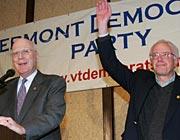

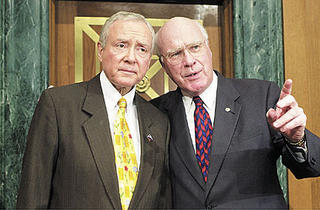
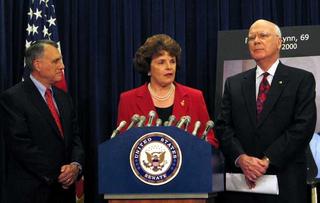
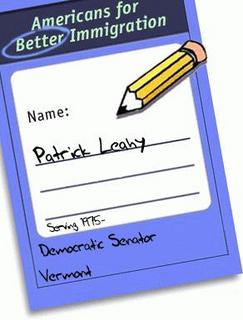



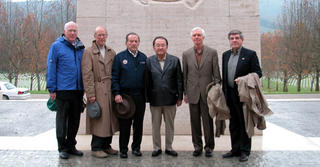

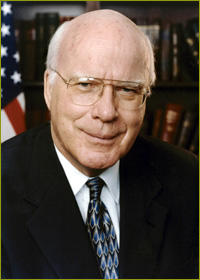
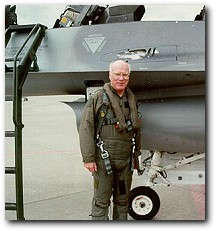
I rise to speak about the situation in Nepal, which has received too little attention by the Congress. I will not take the time to discuss in detail the history of this tiny country wedged between China and India. Suffice it to say that not only is Nepal among the world’s least developed countries, it is also facing a ruthless Maoist insurgency and a political crisis instigated by King Gyanendra which together threaten to turn Nepal into a failed state.
Last year, after receiving disturbing reports of widespread human rights violations by the Royal Nepalese Army, including arrests, disappearances, torture and extrajudicial killings of civilians, the Congress imposed a number of conditions on our military aid to Nepal.
Those conditions required the Nepalese Government to
(1) comply with habeas corpus orders issued by the Supreme Court of Nepal;
(2) cooperate with the National Human Rights Commission to identify and resolve all security related cases of individuals in government custody;
(3) grant the National Human Rights Commission unimpeded access to all places of detention; and
(4) take effective steps to end torture by security forces and prosecute members of such forces who are responsible for gross violations of human rights.
Unfortunately, not only have those conditions not been met, the situation was made significantly worse on February 1st when King Gyanendra, with the backing of the security forces, dissolved the multiparty government, arrested and jailed political opponents, human rights activists and journalists, and declared a state of emergency.
The state of emergency has since been lifted, but civil liberties, including freedom of the press and association, remain restricted, the former Prime Minister has been jailed for corruption by an extrajudicial, politically motivated anti-corruption commission, and arrests of journalists and democracy activists continue.
Speaking with one voice, the United States, Great Britain, and India ondemned the King’s actions as a setback for democracy. They said it would make it more difficult to resolve the Maoist problem, and each country imposed varying types of restrictions on military aid. Since then, however, the American Embassy has adopted a more nuanced approach, sending mixed messages that have been widely interpreted as giving equal consideration and validity to the views and actions of the King and the political parties. Unfortunately, the impression today of Nepalese pro-democracy and human rights activists is that the United States is not fully behind them.
The army insists it is complying with habeas corpus orders of the Supreme Court. This is deceiving, however, because the security forces, often in plain clothes, have been re-arresting people who the court has ordered released. In some instances they have waited at the courthouse steps to take people back into custody immediately after they are set free by the court. Since these arrests are often made without charges, the whereabouts and treatment of these people is often unknown.
In April, the term of the National Human Rights Commission expired and the government reconstituted the Commission in a manner that was incompatible with the 1990 Nepalese Constitution. The membership of the Commission has also changed, with the exception of the chairman.
Not surprisingly, none of the current members, appointed by the palace, expressed publicly any disagreement with the King’s February 1st actions, including the arrests and curtailing of civil liberties. The chairman of the Commission even expressed support for the King’s actions. This has caused legitimate concerns about the Commission’s independence.
There is conflicting information about the government’s cooperation with the National Human Rights Commission in resolving security related cases of persons in custody. According to human rights groups, the situation has not improved. The Commission has said it is getting better access to places of detention, but it is not clear how meaningful this access is. We know there are large numbers of people who have disappeared, yet we are informed that when members of the Commission visit army barracks they have seen few detainees, are led around by army escorts, and that some barracks where detainees were reported to be held were completely empty. There is a concern that the army is summarily executing prisoners. Meanwhile, the International Red Cross has suspended its visits to prisoners because of the army’s failure to provide the access it requires.
The issue of ending torture and prosecuting members of the security forces who commit gross violations of human rights, is also difficult to assess. According to human rights groups, torture is routinely practiced and impunity remains the norm. The army claims it disciplines its members who violate human rights, but many of the cases it cites do not involve human rights violations. According to the army officer who heads the army’s human rights cell, complaints about human rights violations by the army are “much ado about nothing.” Those words speak volumes.
Under our law, the Secretary of State is to determine whether the conditions have been met. As a sponsor of the law, I would expect that prior to making any determination she would consult with representatives of reputable human rights groups, including the UN High Commissioner for Human Rights, as well as with the British and Indian governments. It is important that we and they be seen as united on these issues.
In that regard, I would hope that she would consider the implications of such a determination in the context of the larger political crisis. We do not want to do anything that could be seen as further evidence that the United States supports the King when he is using the army and police to crush the forces of democracy.
Last week, the Senate revisited the conditions on our military aid for Nepal. Since those conditions were enacted prior to February 1st, they have in large measure been eclipsed by subsequent events. The Senate determined that modifications were needed, and those changes were adopted unanimously on July 20, 2005, in an amendment to the fiscal year 2006 State, Foreign Operations Appropriations bill. I ask unanimous consent that the amendment, which if agreed to by the Senate-House conference committee will apply to United States military aid for Nepal for the fiscal year beginning October 1, 2005, be printed in the Record at the end of these remarks.
Nepal is a breathtakingly beautiful country facing immense challenges. The majority of its people are illiterate, subsistence farmers who are caught between the Maoists, who extort money and food, forcibly recruit their children, and commit atrocities, and the army which mistreats and often shoots those suspected of sympathizing with the Maoists.
The King, while professing to support democracy, seems determined to take the country back to the pre-1990 feudal days. This is not the first time he has dismissed the Prime Minister, and since February 1st he has surrounded himself with elderly advisors from the Panchayat era. He has ignored repeated urgings by our ambassador, and other governments, to sit down with representatives of the political parties to develop a plan for the prompt restoration of multiparty democracy.
As in any country where multiparty democracy has existed for only a decade and a half, Nepal’s fledgling political parties suffer from internal divisions and are struggling to establish their credibility with the Nepalese people. This should surprise no one. Democracy is never perfect, and that is particularly true in an impoverished, isolated kingdom whose people have been ruled by a monarchy that ignored their needs for centuries. Yet, despite these obstacles, Nepalese journalists, political activists and civil society continue to speak out.
What is the alternative? A Maoist “people’s republic” that could plunge Nepal into darkness? A return to an active monarchy that is accountable to no one?
Nepal is at an historic juncture. The Maoists have made steady gains over the past decade. Once a minor irritant, today they are a national menace. Even since 2001, when King Gyanendra ascended the throne and became commander in chief of the army, the Maoists have grown stronger. Although they are unable to hold territory or to seize power in Katmandu, they pose an increasing threat to the security and livelihoods of Nepal’s people.
The King has made a tragic blunder, and the Nepalese people are paying a heavy price.
Former Prime Minister Deuba is in prison, which the State Department has rightly called a setback for democracy. This week there were new arrests. On July 25, several dozen journalists and civil society leaders were arrested and detained for over 24 hours during a peaceful protest. On July 27, a pro-democracy student leader, Gagan Thapa, was arrested while attempting to visit fellow detained student leaders.
Mr. Thapa is reportedly being held on suspicion of sedition. His arrest is a threat to all democracy activists and should be strongly condemned by the State Department.
The King’s strongest card is the army, but it lacks an effective counterinsurgency capability, it cannot defeat the Maoists in territory as rugged and isolated as parts of Afghanistan, and it has abused and alienated the very people it is supposed to protect. The army needs to demonstrate that it is worthy, if it wants U.S. support.
Earlier this year, in order to avoid criticism at the UN Human Rights Commission, the King agreed to permit the UN High Commissioner for Human Rights to open an office in Nepal and deploy human rights monitors. This is a welcome development, which the U.S. should strongly support. If the UN monitors are provided with unimpeded access, they should be able to determine if the Maoists are prepared to stop attacking civilians and recruiting children, and if the army is serious about respecting international humanitarian law.
Recently, the UN Secretary General’s Special Advisor traveled to Nepal to assess the situation. He concluded that a solution to the crisis rests on three elements: “a return to constitutional order and multiparty democracy, an end to hostilities, and inclusive national dialogue towards a negotiated solution to the underlying causes of conflict.” The UN has a long history in Nepal, and it could play a key facilitating role on each of these elements. I would hope that the State Department would publicly support this.
No one should minimize the challenges. The Maoists have yet to demonstrate that they are ready to abide by a ceasefire, which should be a prerequisite for negotiations on their political demands. But our policy should be unambiguous.
Democracy is the only viable alternative, and we should make clear that we unequivocally reject the King’s imperial ambitions, that the days of an active monarchy are over, and that we support the political parties. Whether that means the restoration of the 1999 Parliament or the formation of a new constituent assembly, is for the Nepalese people to decide, but there should be no doubt that we support a political process that is open, transparent, inclusive and accountable to the people.
Democracy and dialogue are the key to peace in Nepal, and we should do everything possible to reaffirm our willingness to work with the political parties, with Nepalese civil society, the Indian government, the British government, other key countries, and with the United Nations, towards that end.
Video: CSPAN2 News 08:00 15/07/2005

